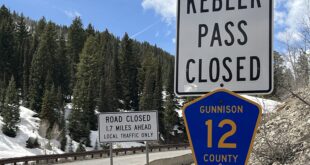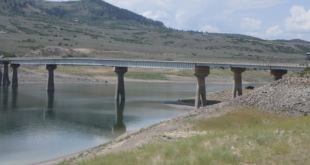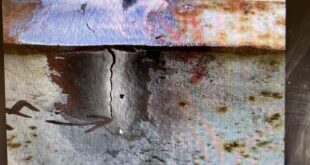“It’s hard to live at 9,000 feet. And we should keep it a little bit hard.”
[ By Katherine Nettles ]
Among a low-key panel discussion in a basement level conference room in mid-February, a group of local leaders and visitors got together to discuss ski town viability, from Crested Butte to Telluride to Girdwood, Alaska. What they had to say was that small towns can do big things with the right combination of creativity and determination—and they can influence the larger world as well. Crested Butte and Gunnison County, each in their own ways, were heralded as such examples. The bottom line: keep gritty places a little bit gritty.
The panel capped the four-day Blister Summit at the Elevation Hotel for the Mt. CB-based gear review company. Alongside demos and skiing/riding focused excursions, the event hosted panel discussions each evening, highlighting gear, technology, and athlete input on the outdoor recreation industry. But it culminated in the final conversation about mountain town viability.
Jason Blevins, a reporter at The Colorado Sun, moderated the group made up of Wagner custom ski founder Pete Wagner of Telluride, heli ski guide and physician Paul Forward from Girdwood Alaska, Gunnison County commissioner chairperson Jonathan Houck and Crested Butte town manager Dara McDonald.
Blevins led off with a question about what small town leaders could teach a larger audience, and then got into the impacts of recreation and development.
“Sometimes in these small towns we see these communities really innovate and be progressive, and do things that give us a model for some of our larger issues. They’re remote and they have to be collaborative,” said Blevins.
“There are in some cases fewer roadblocks to at least trying stuff,” answered Wagner. “But it’s hard to say: can those things scale? I’m actually not sure. But the spirit of being in a small community, having easy access to people and being able to brainstorm and maybe just try things on a smaller scale is one of the takeaways I see.”
Houck talked about being a small community in a very big space. “There’s enough of us here to kind of have a critical mass and think of things in a new way, but there’s not so many of us that we can’t be innovative and creative,” he said.
McDonald discussed ways the town of Crested Butte has limited house sizes in town since the 1990s, enacted a residential ban on natural gas, and created a community compass process using authenticity, boldness, connection and accountability for navigating issues. “To have elected leaders in our community who truly live by the values of the community,” she said, gives direction to tackling sometimes conflicting values such as creating more affordable housing and habitat conservation.
“Crested Butte is a small enough microcosm that we can take big risks and show others that things are possible,” said McDonald.
The group also discussed how the county is striving for more renewable energy, including geothermal energy.
“There are things that we’ve tried here that engineers and scientists have said no, no that’s not going to work,” said Houck. “But we’re small enough and determined enough that we decided to go down that path anyway. And we’ve found some solutions and opportunities…What we’re doing here individually may not make a huge difference on the global scale, but if the influence of small communities and small counties can reach out and start effecting policy that can be really positive.”
Forward, on the other hand, spoke candidly about how Girdwood, a resort town in the municipality of Anchorage, has struggled to find its voice in a larger area with different political views. He said despite its location in an area of glacial ice melting faster than almost anywhere else on the planet, the town’s climate goals go largely unheard.
Blevins asked the panelists how they feel about recreation as a major economic driver for rural Colorado areas.
“As these communities transition away from coal and extractive industries,” Blevins prompted, “only recently are we starting to gauge and measure the impacts of recreation, what it’s doing to our wildlife and how it’s impacting our ecosystems.”
Wagner spoke of marketing money shifting into recreating responsibly in Telluride, such as a campaign called “live like a local.”
Houck asked at what point recreationalists might start paying to use trails, much as ranchers pay to use public land for their livestock and hunters pay for a license. Panelists discussed how recreation could take a seat at the political table along with other influential industries such as agriculture, extraction, and timber, and how to balance access through permit systems and other management strategies.
“We are all in the midst of those conversations, understanding how we keep it really special but let people experience it. It’s a fine line,” said McDonald. She also addressed the equity issues of who has access to attaining permits or camping reservations, and who doesn’t.
Houck agreed, “That balance is hard. Those experiences are life changing; they’re transformational and I don’t want other people to not be able to have those experiences I’ve had. But how do you temper that with a sense of stewardship and responsibility?”
Forward spoke of how when people directly experience inspiring landscapes, they tend to care more about them as well.
Blevins and McDonald joked about keeping mountain towns “a little bit shitty,” or being welcoming but not overly accommodating.
“We’ve really done such a good job of polishing our rough edges,” said McDonald, which can create expectations among visitors. “It’s hard to live at 9,000 feet. And we should keep it a little bit hard. I can’t hire enough plow drivers; your roads are going to be a little shitty,” she said. “And deal with it. That’s okay.”
She said it isn’t that the wealth coming into the community is ill-intended, but folks building large homes may expect to have gardeners, plowers, cleaners and other staff and service workers that are not actually available or sustainable.
Houck also recognized how conserving land has also driven up values, and how many other formerly “gritty little towns” are seeing an influx of vacation homes and investment properties that strain resources. “I am genuinely scared for what the future looks like for communities like ours,” he said.
He said more density in housing in and around the towns is part of the county’s plan, as is recognizing “There’s only so much water. There’s only so much land.”
Among the closing remarks was one from Houck: “Not everyone is going to be able to live in the mountains…and owning something is part of the problem. There is the ability for people to enjoy the mountains, enjoy the desert, enjoy these wild spaces. The problems are coming from people wanting to own part of it, to possess it.”
All Blister Summit panel discussion recordings can be found at blisterreview.com.
 The Crested Butte News Serving the Gunnison Valley since 1999
The Crested Butte News Serving the Gunnison Valley since 1999





